Archive
Why Mississippi’s Religious Liberties Law Is More Nuanced Than You Think
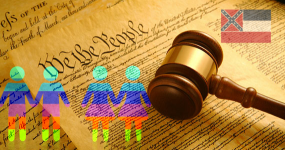 Do you think that a wedding florist should be allowed to deny service to a gay couple just because they’re gay?
Do you think that a wedding florist should be allowed to deny service to a gay couple just because they’re gay?
Do you think that a Jewish photographer should be allowed to refuse photography services to a Neo-Nazi group just because of the nature of that group?
Do you think that a store — on religious grounds — should be allowed to refuse insurance coverage for birth control?
Do you think that an advertising agency — on contrary religious grounds — should be allowed to refuse to help that store’s owners explain their position?
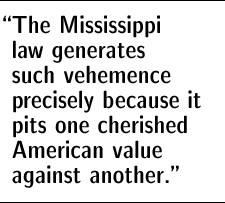 If you have different answers for these four questions, then you appreciate the complexity of Mississippi’s controversial “Protecting Freedom of Conscience from Government Discrimination Act” (HB 1523), which was just signed into law; of Georgia’s similar “Free Exercise Protection Act” (HB 757), which that state’s governor vetoed; and of similar legislation.
If you have different answers for these four questions, then you appreciate the complexity of Mississippi’s controversial “Protecting Freedom of Conscience from Government Discrimination Act” (HB 1523), which was just signed into law; of Georgia’s similar “Free Exercise Protection Act” (HB 757), which that state’s governor vetoed; and of similar legislation.
Mississippi’s law claims to protect people, and groups of people, who act based on a “sincerely held” belief or “moral conviction” in any of three hotly debated tenets:
- Marriage is only between one man and one woman.
- Sex should be confined to such a one-man-one-woman marriage.
- People have only one gender (“sex”), the biological one with which they were born.
Opponents to the law say it legalizes discrimination against, for example, gay couples.
Proponents counter that it protects religious freedoms.
In my opinion, both claims are right (though that doesn’t mean that I think both sides have equal merit). The Mississippi law generates such vehemence precisely because it pits one cherished American value against another.
In this country we believe in equality before the law. We have already established, for instance, that it’s illegal to set out to hire men instead of equally qualified women, no matter how much an employer may prefer working with men.
In this country we also believe in freedom of religion. We have already established, for instance, that the Church can bar women from certain positions of leadership, no matter how qualified they might otherwise be.
Or to look at it differently, the opponents to Mississippi’s law say that, in this case, equality trumps religious freedom. Proponents say that these religious freedoms trump equality.
And here, I think, is the real issue: when these two supreme values collide, which one do we, as a society, choose? And why?
Unfortunately, the public conversation plays out differently.
Proponents double down, defending their religious position, for instance, that marriage is, was, and always shall be between one man and one women. (I think they’re wrong, but that isn’t the point.) They ignore the fact that similar religious arguments were advanced in the 19th century to defend slavery. And they ignore the fact that even Christian-owned stores are not allowed to discriminate against women, even though the Church is.
Opponents also double down, defending their position, for instance, that a marriage between two men is just as valid as a marriage between a man and a women. They ignore the fact that they might experience supreme discomfort if they had to work in support of the KKK. (The KKK probably takes offense at my position, but that isn’t the point.) And they ignore the fact that laws already permit religious gender-based discrimination.
So I have a challenge:
If you defend this law, why do you think that these particular religious beliefs are more important than equality? That is, how is an anti-gay-marriage stance different than, say, 19th-century pro-slavery religious beliefs or, more generally, other gender-based religious beliefs?
If you oppose this law, why do you think that these particular religious beliefs should be squashed? That is, how is forcing people to support gay marriage different than, say, forcing people to work on their sabbath, or forcing people to support other things they don’t like, such as perhaps, the KKK?
And in the meantime, as we continue to discuss this law, perhaps we can at least tread softly out of respect for people who disagree with us.
What Did You Used to Believe?
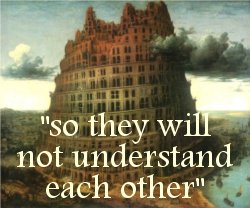 Some years ago, a college student asked me, “what did you used to believe?”
Some years ago, a college student asked me, “what did you used to believe?”
I didn’t understand the question until she clarified, “what did you believe when you were my age that you don’t believe any more?”
It remains one of the best questions I’ve ever been asked.
Lots of things came to mind, but I chose what I thought — and continue to think — is the most important one: I used to think that most people were more or less like me.
I know that that borders on hubris and egotism, but there it is. I used to think that all it took to understand someone halfway around the world was to reflect on my own upper-middle class life in New York.
Obviously, there were differences: financial, cultural, religious, and more. Some people owned private jets and others couldn’t afford dinner. Some children grew up with families in homes and others on the street. Some religious leaders worshiped one god and others worshiped many or none at all. Some languages and cultures demanded formality while others all but precluded it. And so forth.
But I thought that when it came to what really mattered, most people were certainly like me. And — the other side of the same coin — I thought that I could figure out the differences without leaving my home.
I was the modern anthropological equivalent of the 19th-century armchair scientist.
Having now met some of the people I thought were just like me, I believe that I vastly underestimated the range of human diversity. Even my neighbors sometimes exhibit surprising variation. It was folly to think that I understood the people living in war-torn Sudanese refugee camps, imperial Japanese courts, child militias, Tibetan monasteries, remote arctic settlements, etc. — all without ever meeting them or talking with them.
All of this is on my mind as I watch violence flare in the Holy Land.
I learned long ago that even when people disagree — perhaps especially when people disagree — it’s important to ask, “what does the other side believe?”
I fear that in the present case, we have spent too much energy following the ethnocentric path that assumes that “they” are just like “us,” and put not enough resources into really understanding what the other side believes.
It may not help. To pick the obvious and trite example, understanding Hitler would not (I hope!) have made anyone less inclined to defeat him.
But we won’t know until we try.
Truth, Lies, and Sins
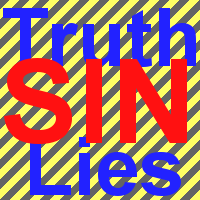 I’ve been thinking a lot about truth lately.
I’ve been thinking a lot about truth lately.
For one thing, it’s been in the national news, for instance when Neil Newhouse, a senior advisor to presidential candidate Mitt Romney, told ABC news that, “We’re not going to let our campaign be dictated by fact-checkers.” That sounds a lot like a dismissal of the truth. Could that be because lying isn’t illegal?
I suspect that it would be a career-ender, or worse, for a campaigner to suggest that “we’re not going to let our campaign be dictated by judges,” or in any other way to suggest that following the law wasn’t supremely important. But, apparently, it’s okay to dismiss the truth.
This callousness about the truth — and the widespread willingness to accept compromises on the truth — is especially surprising in a culture marked by such catchphrases as “truth, justice, and the American way” (originally from Superman) and “the truth shall set you free” (from the New Testament book of John), and whose founding father is lauded because he could not tell a lie.
Truth has a distinguished history: Aristotle loved both Plato and truth, but demands the truth be put first (amfoin gar ontoin filoin osion protiman tin alitheian — “Nicomachaen Ethics” i.6.1), Cato promotes speaking truth even though it’s hard (vera libens dicas, quamquam sint aspera dictu — “Dicta Catonis”), and Cicero claims that seeking the truth is particularly human (hominis est propria veri inquisitio — “De Officiis” i.4.13). Confucius, too, is in favor of truth, arguing that those who hear the truth in the morning can die without regret in the evening (Analects vi.18). So why have we changed our attitude?
Again, is the problem that lying is legal?
I bring up legality because for some time I’ve been interested in the interplay between the law and ethics, and, in particular, the lack of a codified morality in America and other Western nations. People are allowed, even encouraged, to do anything legal, while it’s often okay to do something illegal if you don’t mind the penalty. (For example, I’m told that UPS truck drivers in New York City are told to park wherever they want, because the fines cost less than late deliveries.) Most modern Western citizens are so used to this mentality that they find it hard to imagine things being any other way.
But there are other approaches.
TEDx: Bible Translation and the Next Generation
The Ten Commandments are interesting in that they single out some laws as having moral content. Their point is that killing, for example, is a matter of both legality and morality. (I have more in this TEDx presentation.)
And all of this brings up an essay I wrote for We Have Sinned: Sin and Confession in Judaism, which was just released last week. Central themes of that book include the nature of sin, its role in our lives, and the modern relevance of some ancient prayers that list our sins — both those we have committed and numerous ones we haven’t.
My focus there (in addition to serving as chief translator) is what we learn from being bombarded by sins:
Once we accept that some things are wrong, we have to examine our behavior, even our legal behavior, more closely:The first [thing we learn from the Al Chet prayer about sins] is that some things are wrong. This basic Jewish tenet, so obvious to those who already know it, is neither intuitive nor universal. There are young children who take what they want only because they want it, never asking the deeper, Jewish question of Al Chet: “Is it right to do this?” For them, the world is divided not into right and wrong but, rather, simply into “what I want” and “what I don’t want.”
Most of us, after all, aren’t murderers. Our lives are more subtle. Deception is an accepted part of negotiation, but is there a point at which we might go too far? Can I lie to the police to avoid getting a traffic ticket? Violence is part of a successful defense of peace. Is it justified? Doling out punishment to children helps them navigate the world as adults. How strict should I be? Misleading the ones we love can be an invaluable gift. What do I tell the people I love? Again and again, we wonder: have we done the right thing?
My general point is that taking time to focus seriously on sin is more important now than ever, if for no other reason than we have to remember that some things — like lying, I suspect — are legal but still wrong.
For that matter, Thoreau wrote that “it takes two to speak the truth — one to speak, and another to hear.” Are we who put up with untruths as guilty as those who speak them?
What do you think? Is lying to get elected okay? Is deception as part of negotiation? Where do you draw the line? And how do you know?
Remembering Katrina — A Poem of Political Failure
Horses From Arabia Were Farmer Bush’s Mania.
Now Old Man Bush, he had a farm;
its purpose was to keep from harm
The animals of every kind
that lived around, in front, behind,
And all throughout that special place.
They trusted him to keep them safe.
But Katie came along one day
and made the creatures go away.
This Farmer Bush was known to say, “I run my farm in my own way.
If you don’t like the things I do then let me just say this to you:
You’re not the one they voted for, these animals that I adore.
No, I’m the one they asked to be the leader of the Farm, you see.
“And from the many things I’ve done it should be clear to everyone
Amid the sadness and the strife that I’m the one who values life.
So each and every animal, from horse to cat to pig to bull
Is just as precious, just as dear, to me as every other here.”
But horses from Arabia were Farmer Bush’s mania.
He loved them more than all the rest in part because they were the best,
And also for the help that they all gave him on election day.
Snow-white and strong and proud and slim, the horses had been taught to swim.
The bunny rabbits and the hares were not like snow and were not fair,
But black like cats and proud of it. Old Farmer Bush had not one bit
Of love for them or how they lived and they were not big fans of his.
Their chances to escape were grim ’cause they had not been taught to swim.
When little Suzie heard all that, she thought about the creatures that
Had drowned to death amid the rains while Farmer Bush was playing games.
(‘Cause Farmer Bush, or so they’d said, was on vacation when the dead
First floated up from way down deep.) The pictures of them made her weep.
Some would live and some would die and little Suzie wondered why.
She asked around and quickly learned the poorer creatures had been spurned.
The horses had been given much that helped them to survive and such,
Unlike the bunnies who’d remain at risk of drowning in the rain.
Little Suzie wondered why this Farmer Bush had let them die.
She asked him once and asked him twice, but Farmer Bush said “That’s not nice.
There’s a gov’ner. There’s a mayor. And this is why it is not fair
For you to say that I’m to blame. I treat the creatures all the same.
“And I believe in God above who teaches me I have to love!
I prayed to Him to tell me why those lovely creatures had to die.
But who am I to second guess why God Himself has made this mess?
For I am just a mortal man and God above has got a plan.”
But horsies lived and bunnies died and little Suzie knew just why.
And Suzie knew the simple fact that blamming God was just an act.
She learned of hate and apathy. She cried because she learned to see:
It wasn’t God who let them down. Farmer Bush just let them drown.
For Old Man Bush, he had a farm;
its purpose was to keep from harm
The animals of every kind
that lived around, in front, behind,
And all throughout that special place;
they trusted him to keep them safe.
But Katie came along one day
and made the creatures go away.
Devout or Deranged?
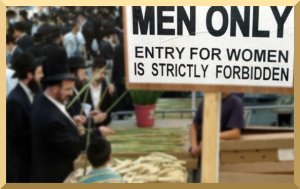 The AP recently reported that some ultra-Orthodox men, “in an effort to maintain their strictly devout lifestyle,” are now buying sight-blurring eye-glasses in order to avoid seeing women (“Ultra-Orthodox Jewish men offered blurry glasses look to keep Israeli women out of sight“).
The AP recently reported that some ultra-Orthodox men, “in an effort to maintain their strictly devout lifestyle,” are now buying sight-blurring eye-glasses in order to avoid seeing women (“Ultra-Orthodox Jewish men offered blurry glasses look to keep Israeli women out of sight“).
Is this really “devout”? Or is it deranged?
I want to be clear: I support freedom of religion. And as fanaticism goes, blurry eye-glasses seem pretty benign, especially in the context of the increasingly common connection between religious zealotry and explosives. But why do we call this behavior “devout”?
 If the Oxford English Dictionary is to be trusted, “devout” is anything that has to do with devotion to the divine. But for me, and, I suspect, most other English speakers, “devout” implies that in addition to being religious, the behavior is (1) unusual, (2) authentic, and (3) desirable.
If the Oxford English Dictionary is to be trusted, “devout” is anything that has to do with devotion to the divine. But for me, and, I suspect, most other English speakers, “devout” implies that in addition to being religious, the behavior is (1) unusual, (2) authentic, and (3) desirable.
The first quality is why the AP (again, following common usage) applies “devout” to the ultra-Orthodox, but not, say, to me in my role of Religious-School director, or to my father is his role of rabbi. Both of us look like most other Americans, while the ultra-Orthodox attire is unusual. Similarly, giving charity and helping the downtrodden is a way many people express devotion to God, but precisely because so many people do them, those practices seldom earn the adjective “devout.”
It’s the second and third qualities that concern me. Both the ultra-Orthodox men (when they oppress women) and the Taliban (when they blow up infidels) are doing what they think is God’s will. When we call the first group “devout” and the second “fanatical,” we are tacitly giving approval to what the ultra-Orthodox do. It’s as though we’re making the case that misogyny is like kindness: laudable, even if we aren’t all always up to the task.
I think that a different division is called for. We should be clear that the blurry glasses are part of a cult of fanaticism, along with segregated buses and other modern inventions of a group of people calling themselves the guardians of tradition. The Taliban are likewise fanatics. And I suppose there are those for whom my own religious practice of lighting plain white candles Friday evening before it’s even dark could come under the category of fanatical. Fanaticism comes in many varieties, and either it’s all devout or none of it is.
It seems to me that the important distinction here is between benign and destructive. When I light Sabbath candles, I’m not hurting myself or anyone else. The same cannot be said for segregated buses or suicide bombers.
I’m not entirely sure where the blurry glasses fall, but either way, I think the AP does everyone a disservice when it excuses some otherwise detestable behavior by calling it “devout.”
Two Monologues And No Dialogue: How (Not) To Talk About Religion and Social Issues
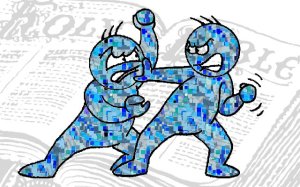 The past few days have highlighted for me once again the degree to which our religious nation is divided.
The past few days have highlighted for me once again the degree to which our religious nation is divided.
 The first example comes from the hugely popular megachurch pastor Rick Warren and his recent reaction when a man slaughtered moviegoers in Aurora, CO. Pastor Warren blamed the violence on those who teach evolution. “When students are taught they are no different from animals, they act like it,” he wrote on his Twitter and Facebook accounts. (He has since deleted his tweet, but not before on-line media such as The Examiner wrote about it.)
The first example comes from the hugely popular megachurch pastor Rick Warren and his recent reaction when a man slaughtered moviegoers in Aurora, CO. Pastor Warren blamed the violence on those who teach evolution. “When students are taught they are no different from animals, they act like it,” he wrote on his Twitter and Facebook accounts. (He has since deleted his tweet, but not before on-line media such as The Examiner wrote about it.)
The second example comes from The Gospel Coalition’s collection of blogs, which featured a post by author and pastor Jared Wilson. In it, Pastor Wilson explains that God’s natural order of things is for men to dominate women, and that rape results from men and women who try to fight that God-ordained hierarchy. (Like Pastor Warren, Pastor Wilson removed the blog post, under protest. Excerpts and an analysis can be found here: “Complementarians and Martial [sic] Sex: The Jared Wilson / Gospel Coalition Saga.”)
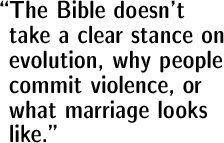 The same Gospel Coalition is promoting an anti-homosexual marriage blog post: Gay Is Not the New Black, written by Pastor Voddie Baucham.
The same Gospel Coalition is promoting an anti-homosexual marriage blog post: Gay Is Not the New Black, written by Pastor Voddie Baucham.
Most of the reactions to these kinds of claims come in one of two varieties: (1) How could anyone possibly agree? or (2) how could anyone possibly disagree?
The naysayers cite their evidence: Pastor Warren has misunderstood the allegorical nature of Genesis, and misunderstood the natural world in that animals don’t tend to slaughter their own kind. Pastor Wilson has ignored passages such as 1 Corinthians 7:3-5 that put men and women on a par in the marriage bed. Pastor Baucham has taken 1 Corinthians 6 out of context while ignoring other relevant passages of Scripture. And so forth.
Then the claimants respond with their own evidence: Morality comes from religion, Colossians 3:18 subordinates women to men, and Leviticus forbids homosexuality.
As a Bible scholar, it’s abundantly obvious to me that both sides find ample support in Scripture. The Bible doesn’t take a clear stance on evolution, why people commit violence, or what marriage looks like — not beyond what we all agree on, at least.
But I don’t think that these are debates about evidence, science, or religion. In fact, I don’t think they are debates at all. They are, rather, collections of diatribes — monologues, as it were, instead of dialogues. And that’s because we tend to focus on our self-selected evidence instead of our motivations.
For example, if Pastors Warren, Wilson, and Baucham discovered that they were wrong about the intent of the Bible (as I believe they often are), would they change their minds? If a new manuscript surfaced, or a better understanding of the text presented itself, would they care? My suspicion is they would not.
Like slavery in its day and usury before that, these issues don’t start with the Bible. They start with how we feel.
So if we’re going to have a real conversation, I think it has to be about our motives, not the texts we choose to support them.
Homosexuality, Hypocrisy, and the Bible
About a year ago I chastized Pastor Joel Osteen and others for what I called “hiding behind Scripture.” In particular, Pastor Osteen had just told CNN’s Piers Morgan that he was locked into his anti-homosexual position by the Bible. He is not, and, I believe, he knows it.
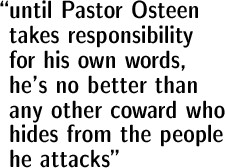 Pastor Osteen just confirmed to Oprah Winfrey that he believes that “homosexuality is shown as a sin in the Scripture,” noting that he encourages people to be “willing to change and grow.”
Pastor Osteen just confirmed to Oprah Winfrey that he believes that “homosexuality is shown as a sin in the Scripture,” noting that he encourages people to be “willing to change and grow.”
On the other hand, when Piers Morgan asked him in October whether he supports the Biblical position of a life for a life, Pastor Osteen admitted (in this video): “I don’t know,” because the death penalty is a “complicated issue.”
In other words, Pastor Osteen doesn’t feel compelled to support everything in Scripture. He openly ignores Exodus 21:24, Leviticus 24:20, and Dueteronomy 19:21. He reserves the right — as we all do — to pick and choose.
This is why I don’t think there’s any merit or integrity to his argument that he is forced to condemn homosexuality because Scripture calls it a sin.
As it happens, I don’t believe that Scripture says that, but I do support Pastor Osteen’s right to interpret Scripture as he chooses.
What I don’t support is the way he presents his opinions as unbiased fact.
As far as I’m concerned, until Pastor Osteen takes responsibility for his own words, he’s no better than any other coward who hides from the people he attacks.
“The Bible Says So” and Other Stupid Arguments
“The Bible Says So”
Between the on-going debate about gay marriage and the recently-noted anniversary of the hugely divisive Roe v. Rade decision legalizing abortion, more people have been shouting: “The Bible says so. That’s how I know!”
Even though I respect the Bible, and even though it forms the foundation of my personal and professional life, I think the argument is stupid.
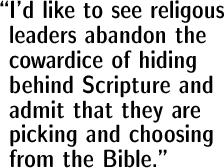 Here’s why: Everyone filters the Bible through their own personal preferences, choosing the parts they like.
Here’s why: Everyone filters the Bible through their own personal preferences, choosing the parts they like.
Two examples will help demonstrate what I mean.
The first comes from the many people who use Leviticus 18:22 — about a “man who lies with man as with a woman” — to defend anti-homosexual positions. (For some reason, this stance seems particularly popular among mega-church leaders, who really ought to know better: Rick Warren, for example, or Joel Osteen, who recently told CNN that the Bible says that homosexuality is a sin.)
The second comes from the many people who use “thou shalt not kill” from the Ten Commandments to defend anti-abortion or anti-death-penalty positions.
Homosexuality
It’s true that Leviticus 18:22 seems to discourage homosexuality, and though it stops short of specifically calling it a sin (which is why I think Pastor Osteen is wrong — more here), I’m not convinced by those who try to interpret the text as being about anything other than homosexuality.
But the very same section of the Bible also prohibits making clothes by combining different materials (Leviticus 19:19), technically known as sha’atnez.
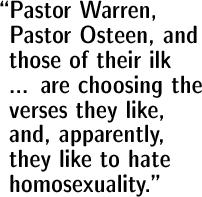 So unless Pastor Warren, Pastor Osteen, and those of their ilk are willing to take a public and vehement position against wool-and-cotton clothing, I have no patience for their argument that they are locked into their anti-homosexual position by the Bible. They are not. They are choosing the verses they like, and, apparently, they like to hate homosexuality.
So unless Pastor Warren, Pastor Osteen, and those of their ilk are willing to take a public and vehement position against wool-and-cotton clothing, I have no patience for their argument that they are locked into their anti-homosexual position by the Bible. They are not. They are choosing the verses they like, and, apparently, they like to hate homosexuality.
Similarly, Leviticus 20:13 condemns homosexuals to death, but the same punishment is mandated for people who curse their parents (Leviticus 20:9). Are those in the “it says so in the Bible” camp willing to pass laws that put children to death for speaking out against their parents?
And for that matter, Leviticus 20:10 demands the death penalty for both the man and woman involved in an adulterous relationship. Is that a law that the anti-homosexuality crowd advocates?
I believe in religious freedom, and if religious leaders want to speak out against homosexuals, I suppose it’s their right. But they are not locked into that position by the Bible. It’s their personal religious choice.
(Similarly themed passages in the New Testament, like Romans 1:26-27, are more complicated, but the same basic principal applies. Romans 1:26-27, for example, takes a negative view of both male and female homosexuality — though not actually calling either a “sin” — but in a much longer passage, starting at Romans 14:1, the same book demands tolerance and acceptance, even of sinners: “Welcome those who are weak of faith,” “[Do not] pass judgment on one another,” etc.)
Thou Shalt Not Kill
Perhaps even more than homosexuality, abortion is one of the most vexing issues of our day. Although people disagree about the details, almost everyone shares the opinion that at some point a fetus deserves the protection afforded to a human — the question just seems to be when. And the death penalty is just as divisive, with the sides remaining even further apart.
But the Ten Commandments don’t help in either case.
First of all, the original commandment doesn’t refer to “killing” but only to “illegal killing,” as in “murder” and “manslaughter.” The message in the Ten Commandments is that killing is a matter of morality. (I have more here.) So the Ten Commandments highlight the importance of getting abortion and death-penalty laws right, but they don’t provide any particular guidance regarding the details.
More to the point, though, the Ten Commandments also prohibit taking God’s name in vain, but we don’t hear religious leaders suggesting laws against that.
So again, I think religious leaders have the right to decide which of the Ten Commandments they think are important, but I also think they have an obligation to be honest with their followers. The leaders are not simply conveying Scripture. They are interpreting it as they see fit.
Hiding Behind Scripture
So when Pastor Osteen says that, “the Scripture shows that [homosexuality] is a sin,” he is being deceptive. What he means is, “my interpretation is that homosexuality is a sin.” When Pastor Warren spends his money to oppose homosexuality (and not, say, to advertise Romans 14:13: “so let us no longer pass judgment on one another”), he is not a neutral interpreter of Scripture. He is, rather, exercising his right as a religious leader to speak about what he personally feels is important.
More generally, I’d like to see religious leaders abandon the cowardice of hiding behind Scripture and admit that they are picking and choosing from the Bible, opting only for what’s important to them.
Darfur and the Silent Voices of Suffering
Rabbi Billy Dreskin will fast for the 24 hours leading up to Rosh Hashanah, as part of the Fast for Darfur program. For Rabbi Dreskin, whose son, Jonah, died tragically just a few months ago, the plight of the population in Darfur is both remote and personal:
I will always cry for Jonah, that is for certain. But what seems like a lifetime ago, I used to also cry for the people of Darfur. Now, six months after I bid farewell to my own child, I am once again able to think of children elsewhere, of other families that are suffering horrendous grief. For this reason, beginning at sundown this evening, I will participate in a 24-hour Fast for Darfur. This seems like the proper moment for me to do this. Rosh Hashanah represents new beginnings. In some small but meaningful way, speaking out for this beleaguered, helpless people — who still await the world’s stopping the crimes of humanity being perpetrated against them — is my way of beginning to live again. I doubt it will stop my tears for Jonah, but maybe it will help move forward a process that will keep other parents from shedding tears for their own child.
I’m reminded of the line in Unetaneh Tokef that references the Biblical kol d’mamah daka, variously “still, small voice” or “small voice of silence.” “Let the great shofar be sounded, and let the small voice of silence be heard,” the prayer reads.
This Rosh Hashanah, as I hear the sound of the shofar, I will listen for the voices of silent suffering around the world. And during the coming year — taking my cue from Unetaneh Tokef — I will do my best to make sure those voices are heard and never ignored.

 I arrived for Shabbat morning services, held indoors, this time, in deference to the threatening weather. The predominantly musical morning was punctuated by short interpretations of Torah, each one presented by a group of three campers, and each one addressing the topic of promises.
I arrived for Shabbat morning services, held indoors, this time, in deference to the threatening weather. The predominantly musical morning was punctuated by short interpretations of Torah, each one presented by a group of three campers, and each one addressing the topic of promises.


